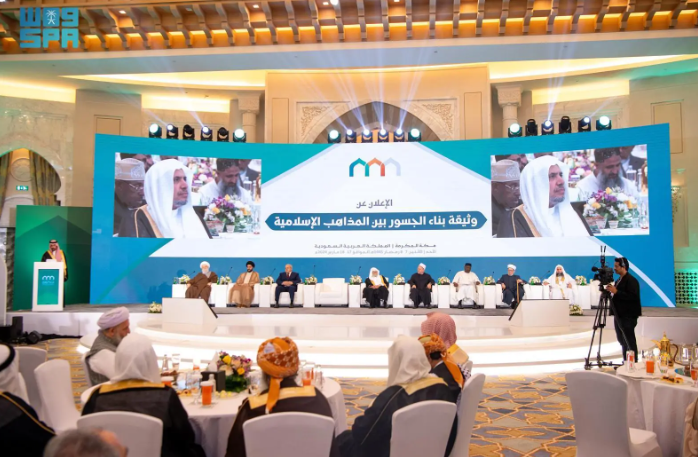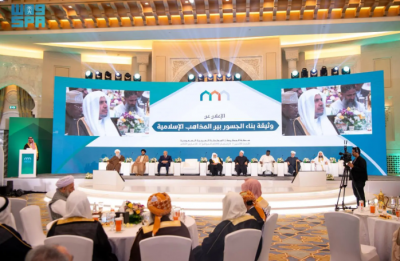Senior scholars and muftis from various Islamic sects and communities have called for overcoming the tragedies of sectarian conflict, adhering to the teachings of Islam, in the "Document for Building Bridges Between Islamic Sects," issued at the conclusion of the international conference: "Building Bridges Between Islamic Sects," organized by the Muslim World League in Mecca, under the patronage of King Salman bin Abdulaziz Al Saud, over the two days of the 7th and 8th of the current month of Ramadan, with broad participation from representatives of various Islamic sects and communities from around the world.
This document extends the principles of the "Mecca Document" signed by the muftis and scholars of the ummah on May 29, 2019, and reflects the pride of the participating scholars in their religion. The "Document for Building Bridges Between Islamic Sects" affirms the awareness of the ummah's scholars and representatives of its sects of the urgent duty to remind themselves of the concept of a single ummah, and that they are in greater need than ever to unite their ranks, harmonize their affairs on commonalities that gather them, unify their divisions, warm their hearts, and bring together their different sects around the core principles, universals, and established rulings and legislations of Islam, which organize their entity and protect their rights.
The conference members emphasized in their declaration of the document that in light of the unfortunate repercussions afflicting their united ummah, the refuge for achieving Islamic brotherhood lies in a complete awareness of the ethics of disagreement, good relations, and being cautious in addressing the dangers of labeling, exclusion, and the negative aspects of accusation and defamation, along with rejecting the risks of misguidance and takfir, which have led to great division, conflict, animosity, and corruption.
The conference participants resolved to overcome futile disputes that have devolved into meaningless arguments that only result in greater fragmentation and division of their united ummah, constrained by concepts that narrow the scope of Islam and its vastness, propelled by a strong will to enhance efforts for unity, fraternity, exchange, and cooperation in significant aspects included in this document reflecting their diverse agreement.
The "Document for Building Bridges Between Islamic Sects" clarified that the formation of the personality of moderation is the responsibility of the learned and righteous scholars and established jurists within their individuals and institutional framework, especially those tasked with clarifying the truths of Islam and highlighting its virtues in its essence, its morals, and its tolerance, as well as correcting misconceptions about it.
The document highlighted that Muslims are united in supporting just causes on both Islamic and international levels, endorsing the steadfastness of the Palestinian people against crimes of genocide, and supporting their right to establish their independent state, with East Jerusalem as its capital, while preserving the historical and Islamic identity of Jerusalem. It stressed that the Islamic identity represents the conviction of every Muslim, necessitating the protection of its components in non-Islamic countries, particularly through peaceful means to recognize the rights guaranteed by civilized constitutions.




